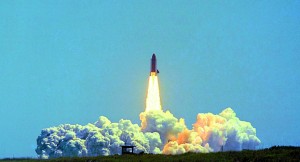
This very significant event could happen in January 2014 on the national test site Hammaguir, situated in the south-west of the country. During 1952-1967, this site was a test center for French space rockets. The first French satellite Astérix was launched from here in 1965. In 1967, according to the Evian Agreement, this site was handed over to the Algerian state.
In order to solve a variety of practical tasks and carry out research, the Arab countries have long sought to make greater use of the opportunities offered by space technology. However, the underdeveloped manufacturing base of the Arab world and the scientific and technical level in the space industry are responsible for their strong dependence in this area from the more developed countries. Nevertheless, despite all this, the Arab states are involved in various international space programs: since 1986, Arabsat satellite communications system has been operating. This organization is an international organization within the LAS and provides, in addition to communication services, space research, meteorological observations and navigation.
The greatest development of space research and practical use of space in the interests of the national economy in the last period can be observed in several Arab countries, but particularly in Algeria.
National space program was implemented in DPRA long time ago. Its main objective for the period until 2020 is to put space technology at the service of social and economic development of the country. In 2001, the Algerian Space Agency was created, which is responsible for program development activities in space, and coordination of stakeholders on the development of technology, assessment of natural resources and environmental protection. Its goal is to launch 10 satellites by 2017. The country seeks to create its own infrastructure for monitoring and control of space objects, as well as to establish a training base for national staff for the space industry.
The Algerian Space Program is a great promising model for other Arab countries. Over the past thirteen years, Algeria has managed to put two satellites into orbit. The first Algerian satellite, the ALSAT 1, was created with the assistance of the UK in 2003, and launched from the Russian Plesetsk Cosmodrome. It is designed for remote sensing, within the framework of international programs for monitoring the Earth’s surface and preventing damage from various natural disasters.
The second Algerian satellite, ALSAT 2 B, was created at the national production base in Oran, and was launched in 2010 from Satish Dhawan Space Centre (Chennai).
As one of the largest states in Africa, in terms of territory, Algeria has objective needs for observation satellites, which are especially important during natural disasters or outbreaks of tension in some areas of the country. Still, Algerians have not forgotten their recent history, when a number of countries refused a request to supply satellite information for operations involving fighting terrorism on their national territory.
Since 2002, Algeria has moved along the path of space exploration to the development of its own research and production base in this industry. These facts have allowed the country to change its status from an observer on the Committee on the Peaceful Uses of Outer Space (COPUOS) to a permanent member. Moreover, the scientific subcommittees in this UN structure were led twice by this country – in 2008 and 2009. The accumulated experience in processing of satellite data allows Algeria to provide regional coordination in the field of disaster prevention and the emergency program “UN SPIDER”, covering North Africa and Sahara-Sahel Region. DPRA is also working closely on the peaceful exploration of space with a number of countries, including not only the world’s space industry leaders, but also African states such as South Africa, Nigeria and Kenya.
According to international experts, after the launching of its own satellite from its own test site in January 2014, Algeria will occupy its rightful place among other space powers, which will further strengthen the international prestige of this country.
Vladimir Platov, an expert on the Middle East, exclusively for the online magazine “New Eastern Outlook”.